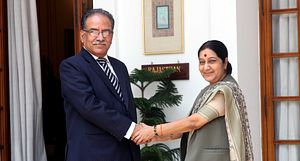On his return from a three-day state visit to India in September, Nepali Prime Minister Pushpa Kamal Dahal (also know as Prachanda) lauded his visit for creating fertile ground to elevate Nepal-India relations to new heights. Considering the failure to issue a joint statement during the India visit of the previous prime minister, Khadga Prasad Oli, earlier in 2016, the issuance of a 25-point joint statement this time around has been lauded as an achievement of the current premier’s visit – a marker that bilateral relations are beginning to look more cordial. Hope for the relationship is so glum among the masses and political elites alike after the political head-butting resulting from the undeclared blockade last year that the mere issuance of a joint statement is lauded more than any actual quantifiable progress.
A Visit Without Agendas?
During KP Oli’s Delhi visit six months ago, things were a little different. In Oli’s nine months at the helm of the Nepali government, his relational choices were constrained by external factors – primarily India’s opposition to the newly promulgated Nepali constitution and Oli’s treatment of disgruntled factions, primarily the Terai-based parties. Oli’s government was further alienated from Delhi due to the lack of impetus shown to remove a de facto blockade at the India-Nepal border. These external constraints were internalized into domestic factors, such as public opinion with nationalist and anti-Indian overtones, that subsequently shaped the Oli government’s dealings with India.
The inability to produce a joint statement during Oli’s state visit related to these very constraints. Delhi refused to issue a statement implying that the the Nepali constitution was welcomed in India, while Kathmandu was adamant that these particular points be included, primarily for their domestic audience.
In July, the Communist Party of Nepal (Maoist Center), a key partner in the Oli-led coalition government, withdrew its support. Subsequently a new coalition government was formed in August, led by Prachanda with the Nepali Congress as the key coalition partner, while the Oli-led CPN (Unified Marxist-Leninist) party chose to remain as opposition. The move to withdraw from the coalition and form a new government is widely believed to have been orchestrated or at the very least influenced by Delhi.
Prachanda’s immediate visit to Delhi just six months after a state visit by the previous prime minister has raised a lot of eyebrows. A visit so soon would have no expectations or agenda. Before his visit, Prachanda said that the main objective of the visit was building trust between the two nations. He went further and assured his coalition partners as well as the opposition that he would not sign any grander agreement that could be deemed against the interest of Nepal.
So it was no surprise that apart from India’s promise to extend an additional line of credit for previously agreed-upon road and electricity infrastructure projects and construction of a polytechnic institute, nothing substantial came out of the visit. The joint statement, however, indicates that this time around the Nepali delegation was much more accommodating in inserting the nuances of Delhi’s interests. Not only did the joint statement omit any suggestive terminologies referring to India warming up to Nepal’s new constitution, it made genuine attempts to give the impression that India has still not accepted the new constitution wholeheartedly.
Some experts have argued that this visit had no agenda, and hence a debate about its success or failure is pointless. While there may have not been any particular grand bilateral policies at stake, personal and domestic agendas were at play. The visit, for both the BJP-led Indian government and the newly crowned Nepali government, was a symbolic gesture manufactured for the purpose of consumption by their respective domestic actors.
The visit and the subsequent mention of constitutional reform in the joint statement was Prachanda’s effort at signalling to the disgruntled parties that he is committed to addressing their issues and if the need arises he is responsive to Delhi’s interests, too. For the BJP-led government, the restoration of an India-friendly government in Kathmandu followed by the first official state visit was an act of reassurance to its domestic audiences that Delhi is still well and truly privileged in Nepal.
A Successful Visit?
In a transitional democracy like Nepal, the role of a leader is essential for shaping both the domestic and international policy decisions. As the leader, Prachanda now bears the responsibility of negotiating outcomes in both the domestic as well as international spheres. In the international sphere, with his visit to India, Prachanda attempted to court Delhi’s support for himself and his newly crowned government. The visit acted as a symbolic gesture toward domestic actors, primarily the disgruntled Madhesi movement, that his government is willing to act on the promised amendment of the constitution.
But this visit of his has further alienated some other the domestic actors, most importantly the opposition party CPN (UML). Getting them on board for any form of amendment to the constitution will need all his guile. Furthermore, the sections within the Madhesi movement aren’t really as upbeat as Prachanda would have hoped after the visit. Since he has repeatedly pushed backed the dates for tabling an amendment of the constitution in the assembly, talks of reconsidering the support Madhesis have provided the Prachanda-led government are rife. A new timeline has been promised for the amendments to be tabled in the assembly, meaning a pivotal political moment for Nepal is at hand.
Although described as being too emotional at times, Prachanda is deft at playing both sides and can be responsive to appeasing both domestic and international actors. It remains to be seen how well can his recent visit to India and his very near future efforts bear durable solutions to Nepal’s woes.
Ashik KC is Marie Curie Fellow at the Institute of International Relations, University of Warsaw, Poland.
Deepjyoti Chand is a PhD Candidate at the Institute of International Relations, University of Warsaw.

































